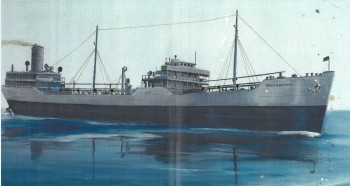75th Anniversary of the Sinking of the SS GulfAmerica
 The night of April 10, 1942 started as a typical Friday night for people in the Beaches area. Jacksonville Beach was teeming with crowds kicking off their weekend with a visit to the boardwalk amusements, attending a dance at the pier, or catching the latest movie at the local theater. At approximately 10 p.m., however, the night took a very different turn.
The night of April 10, 1942 started as a typical Friday night for people in the Beaches area. Jacksonville Beach was teeming with crowds kicking off their weekend with a visit to the boardwalk amusements, attending a dance at the pier, or catching the latest movie at the local theater. At approximately 10 p.m., however, the night took a very different turn.
It was World War II and wartime activity had picked up all along the Atlantic coastline. U-boats – German submarines – were frequently spotted only a few miles off-shore. One of their objectives was to diminish the supply of materials available for the U. S. military to use in the war. Until that night, the war still felt far away for the people of the Jacksonville area.
Earlier in the day, a U-boat – U-123 – had spotted a U.S. oil tanker heading up the coast of Florida. The tanker, SS Gulfamerica, was on its way back to New York after its maiden voyage to pick up thousands of gallons of fuel from Texas. The precious cargo carried by the Gulfamerica made it an instant target for the U-boat, which stalked it up the coast of Florida. U-123 caught up to the Gulfamerica off the shore of Jacksonville Beach and opened fire on the ship.
The tanker was easily visible to the U-boat against the lights of the beach city. Since the ship was full of fuel, a large fire quickly spread around the sinking boat as the crew hurried to escape the attack. Hearing the explosions out at sea, people all along the beach rushed outside to watch in shock and horror as the U-boat continued its assault on the ship. The captain of U-123, Reinhard Hardegen, recalled looking out at the beach and seeing people rushing out of hotels, their faces red from the light of the ship’s fire. They could see the crew members making their way out on life rafts or jumping into the burning water.
Some locals like Townsend Hawkes later recounted their efforts to take smaller boats out to the scene in an attempt to rescue survivors. Navy patrol boats also arrived to pick up survivors and bodies. In a 1990 news article, Quartermaster Morris Smith recalled pulling in survivors who were covered in oil and badly burned. Of the 48 men on the Gulfamerica, 29 survived the attack, 12 bodies were recovered from the sea, and 7 were never found.
While the attack was swift, the tanker took several days to sink completely and the effect of the attack was lasting. A ban on nighttime lighting at the beach was issued following the event to avoid illuminating other American ships for the enemy. The war had reached the shores of Northeast Florida and the attack on the Gulfamerica was remembered by residents of the Beaches area for decades after.



